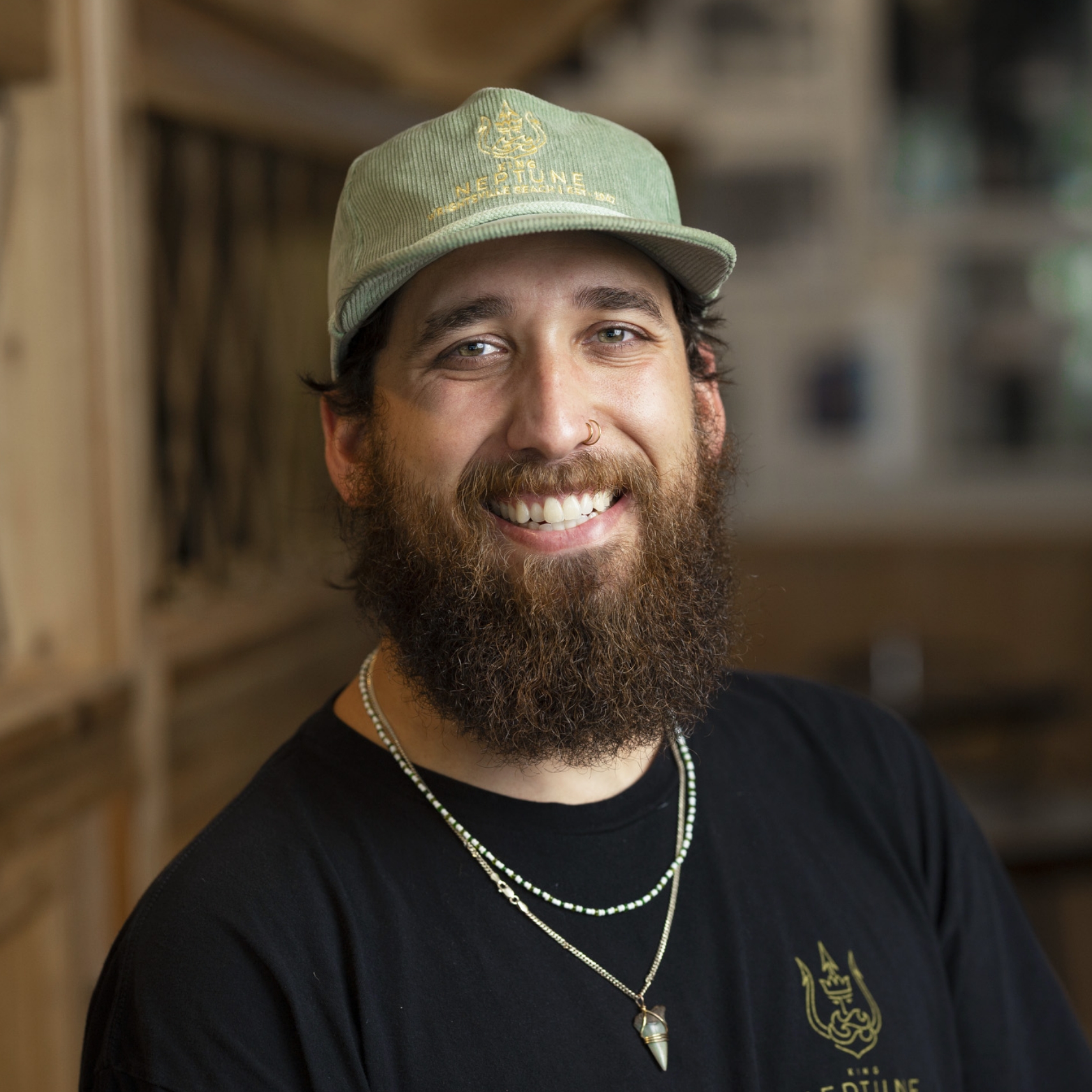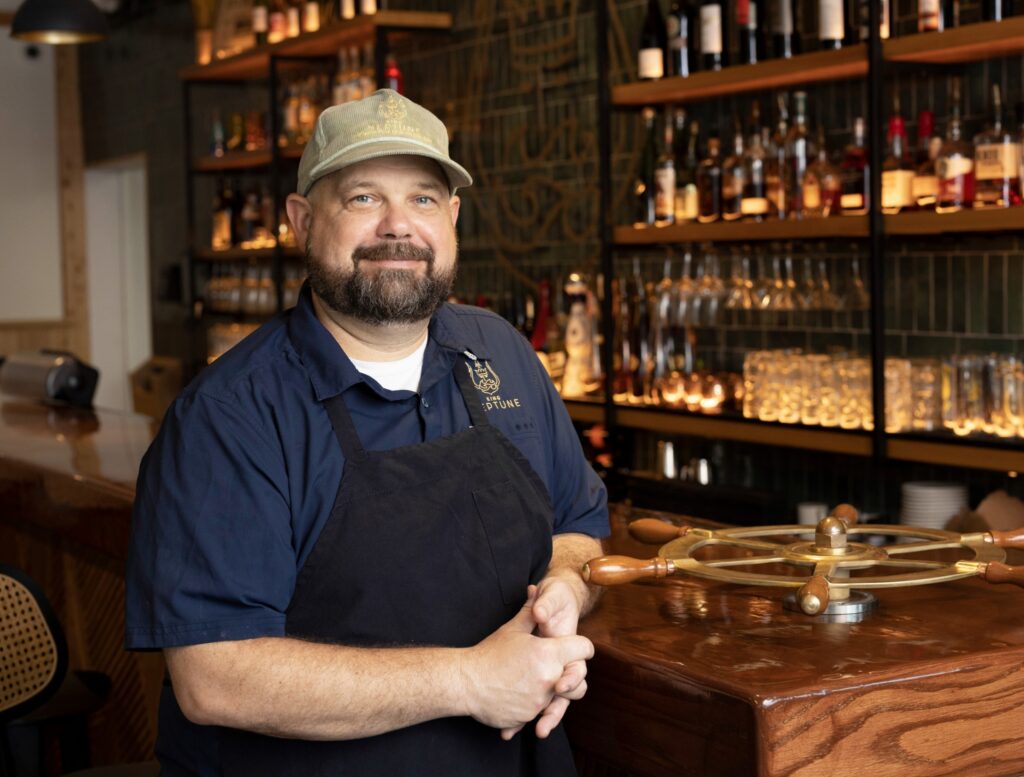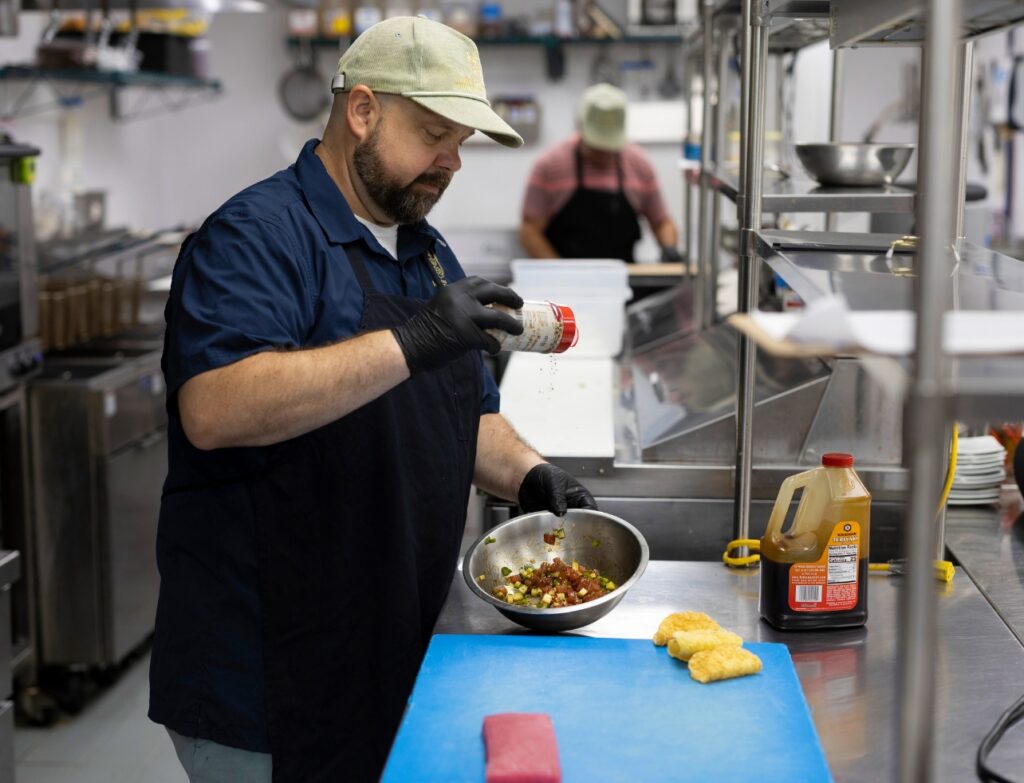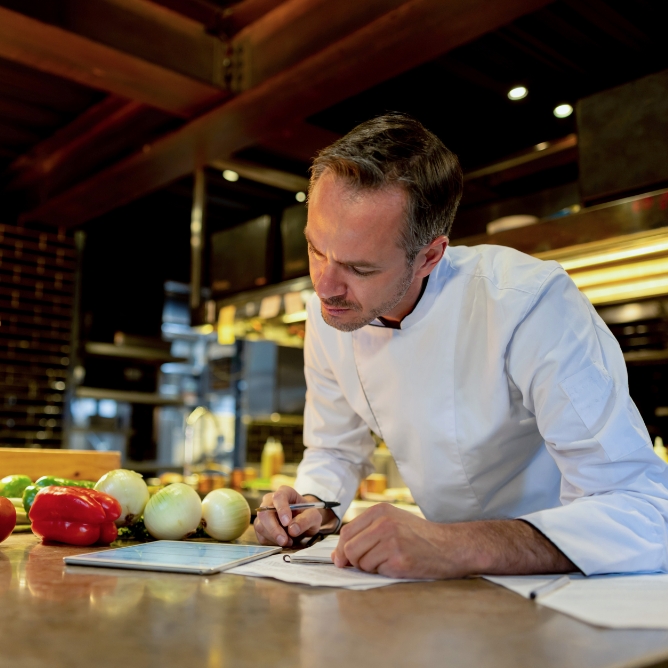Nick Chavez
& John Anderson

co-chefs,
King Neptune Restaurant
Chavez’s career path
- Dishwasher
- Prep cook
- Line cook
- Sous chef
- Chef
- Executive chef
- Co-chef
Two Chefs, One Kitchen, Same Goal
King Neptune Co-Chefs Nick Chavez and John Anderson will say they are very different from each other. Chavez is the more creative one, while Anderson abides by structure and order. Chavez has basked briefly in the bright lights of celebrity chefdom, with appearances on the Food Network’s “Beachside Brawl” competition. Anderson avoids such attention.
But both share a seriousness and a dedication to their craft that’s resurrected their 76-year-old Wrightsville Beach restaurant, giving it a new identity. They’ve taken its original staple menu of fried seafood baskets and modernized it with specials like lobster pho and grilled lamb T-bone topped with a fig demi-glace.
While it’s unusual for co-chefs to lead a kitchen in this way, their shared responsibilities play to their strengths. Anderson’s presence is felt on the dayside, while Chavez reigns at night. Anderson’s discipline and attention to detail balances Chavez’s free spirit.
“It’s not always easy, but it’s good,” Anderson says. “It’s good because we’re opposite, and he pushes me to be uncomfortable, and I push him to be more organized.”
“I’m the wild card, for sure,” Chavez says. “He is the structure. Sometimes I struggle with that side, and it’s good to have that other half to learn from. That’s why I love this career. You’re always learning. Just to have someone like that who’s more mature in his career, has [run] great restaurants in Raleigh and has a good name, is good to have along my side.”
Chavez also says that sharing responsibilities makes their jobs less stressful and allows them more time off.
Here’s more about them.

Nicholas Chavez, co-chef, King Neptune Restaurant
On a wild youth and learning discipline:
I was kind of a misfit, kind of taking the bad road and getting in a lot of trouble and stuff. And my mom actually made me get my first job as a dishwasher. She was tired of me getting in trouble. I just happened to fall into a kitchen [at Bear Rock Café in Greensboro], washing dishes. And [working in kitchens] is the only thing I’ve done since I was literally 16 years old. I’m really fortunate to have found this life and something that I’m actually good at and have prospered in.
I think restaurants offer this sense of family and structure, that some of us who are a little bit wild and adventurous and maybe artistic want that freedom, but yet it’s still controlled.
I think restaurants offer this sense of family and structure, that some of us who are a little bit wild and adventurous and maybe artistic want that freedom, but yet it’s still controlled. If you don’t do what you need to get done, the restaurant will fail and it’s all on your back. I think it helps push people to be better, when they have that pressure a little bit. And it gives people something to work for.
On country clubs as a chef training ground:
Clubs offer a great way to learn. That’s why I took that route at first. At country clubs, money really isn’t an object. You can work with the best ingredients in the world, and these members want that. They want to be catered to; they want to have that fine caviar, the foie gras, and all the fancy little things that I really enjoy. I really love being able to work with those products and learn about them.
I think country club chefs don’t really get enough notoriety. I think that they kind of get pushed under the rug just because they’re not in a public place to eat. But some country clubs are making some of the best food in the world. Michelin-grade food that people don’t even know about. It’s really incredible. You see a lot of great chefs start off in country clubs, honing their skills, using [country club] money to learn and to perfect their craft. And then taking that and just going public with it.
On the kick in the pants he needed:
Mary Geiss [the general manager] at Cape Fear Country Club was really someone who pushed me a lot. As a young chef, I worked under a lot of tough chefs, so the toxicity was a little bit high. I dealt with that in different ways. I used to go out partying every night after a shift. We partied hard, and I would come in the next day feeling like crap.
She’s like, “Nick, you can’t do this. Look at yourself. If you continue, you’re going to be cutting carrots for the rest of your life.”
I was like, “I don’t want to cut carrots forever. I want to keep moving forward. I would like to be the lead one day.”
She sat me down and was like, “You have this opportunity in front of you. Are you going to grab it, or are you going to just continue to cruise?” I think that’s something that I needed as a young chef. She told me, “You can make a career out of this. You can be successful if you try, if you really try.”
Everyone in my kitchen I call sous chef. Everyone in there, even the dish pit guys, I call them sous chefs. Because I don’t think any job is more important than any other back there.
On kitchen hierarchy:
Everyone in my kitchen I call sous chef. Everyone in there, even the dish pit guys, I call them sous chefs. Because I don’t think any job is more important than any other back there. I can’t do what I have to do without them doing their part. I think it also gives them a sense of responsibility, and it teaches them to take ownership of what they’re doing.
I think equality is huge in kitchens. I definitely understand the structure of a standard brigade system, but I think there’s also flaws with that. I think as we chefs progress, we need to modernize things. And I really like the way we run it here. I really love treating everyone with respect, and everyone’s responsible for themselves.
Anderson’s career path
- Busser/Dishwasher
- cook
- Head Chef
- Culinary Director
- Corporate Chef
- Co-chef

John Anderson, co-chef, King Neptune Restaurant
On pizzerias, delis, and fried seafood:
My first job was washing dishes at South Hills Seafood in a little strip mall [in Cary]. My buddy had gotten a job there, and he kept coming home with money and food, and I was like, “Man, I could use both of those things.” I started working with him. I would bus tables, get all the dirty dishes, clean them, and put them away. And then eventually somebody doesn’t show up, and now I’m cooking. That’s when it became fun, because it was scary and challenging.
I cooked there for a long time. So, I started doing it at other places. There were pizzerias, delis, fried seafood, then sports bars. It was good food, but after a while, I started wanting to do something better.

On giving up control and leaning into flexibility:
There’s so much that’s out of your control. The things that you can control are sanitation, orderliness, cleanliness, and constantly working on efficiency, constantly trying to get better. I still learn from everybody in here today. Whether you’re a food runner or a dishwasher, somebody’s going to think of a smarter, better way to do something that I haven’t thought of yet. So that’s going to stay the same. I’m always going to watch everybody and try to keep learning. So as far as food and staff goes, I have no control over those. The pricing of it, I have no control over. Whether it shows up or not [is] what we’re dealing with today.
So, it’s just being flexible and understanding that things aren’t going to go the way you want them to go. Hopefully you have fun hitting curveballs, because that’s what it is. At least that’s all I’ve ever witnessed. It’s about how you adapt to what’s happening.
The rewards are cool. We get to meet a lot of cool people, and you have this really great feeling of gratitude at the end of the evening.
On what’s satisfying about his job:
The rewards are cool. We get to meet a lot of cool people, and you have this really great feeling of gratitude at the end of the evening. We were talking about it the other day, and it’s like every time you pull a ticket down and grab it, that was four orders that you know that your team did right and that went out on time. So, it’s gratification, grab it, gratification.
And you get feedback, too. You get a lot of feedback, hopefully mostly good, but you’ll get constructive criticism, too. But that instant feedback is terrific.
I think if everybody did a mandatory two years, maybe even both the military and hospitality for two years, we’d solve a lot of problems.
On why everyone should work in food service:
I think if everybody did a mandatory two years, maybe even both the military and hospitality for two years, we’d solve a lot of problems. Everybody’s a lot nicer to each other because in those atmospheres, you don’t have time to care about somebody’s beliefs, or who they are, their background, or their culture. You’re so beyond it because you realize how stupid … getting worked up about it is.
Search for your next career move today.
browse jobs







